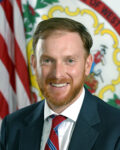Senators are trailing the Justice administration’s transfer of the remaining $28 million in federal covid relief dollars to a fund controlled by the Governor’s Office, which then put millions of dollars from that transfer toward construction of Marshall University’s new baseball field.

“Isn’t that money laundering?” asked Senator Randy Smith, R-Tucker.
No, responded Berkeley Bentley, general counsel for the Governor’s Office.

Bentley was testifying before the Senate Finance Committee, which wanted to know more about the transfer’s reasoning and validity.
He told senators that the state faced a deadline to spend the remaining $28 million from federal Coronavirus Aid, Relief, and Economic Security Act funds.
The state incurred that amount in costs for pandemic-related expenses for corrections and homeland security, he said. Then the state reimbursed its own expenses by using the federal covid money.
Facing the deadline, Bentley told senators, the administration found it simplest to transfer the reimbursed money into the Governor’s Office Gifts, Grants and Donations Fund.
“Once allocated, those CARES-eligible expenses — the $28.3 million — became state dollars, for lack of a better word,” Bentley said. “We spent the CARES money on CARES-eligible purposes, reimbursing the state. That becomes subject to state law, not the federal CARES requirements.”
Among that fund’s distributions following the transfer to the governor’s fund was $10 million to Marshall University to support construction of a new baseball stadium.
Senators seemed to think that money trail had a dogleg.
Senate Finance Chairman Eric Tarr repeatedly asked if the state’s expenses were for corrections then why didn’t the reimbursement go to corrections.

“You’re telling me that you can reimburse, related to any expense the state would have with covid, that the governor can move that money anywhere it wants and say it’s covid-related?” asked Tarr, R-Putnam.
Noting that corrections has staffing shortages that have resulted in a separate, ongoing state of emergency, Tarr went farther.
“Then the governor’s staff claimed that covid-related expenses came from corrections for those monies that we appropriated to them in that state of emergency, and when you transferred the last $28 million — which doesn’t come close to covering any of those corrections expenses, the governor decides to put it into a discretionary account and start putting into astroturf on baseball fields,” Tarr said.
“I want to ask you what part of that is appropriate.”
Bentley replied, “When the state reimburses itself, there is no direction under federal or state law that directs where that money goes.”
Tarr followed up. “You didn’t reimburse those expenses that came from corrections. You reimbursed it to the governor’s discretionary account. And that money — some of it’s still sitting there, much of it’s not — went to a baseball field and other expenses. Is that accurate?”
Bentley: “So far, those are the transfers that I’m aware of out of the fund after the transfer was made.”
Tarr: “There was no transfer to corrections whatsoever out of that money?”
Bentley: “There has been no transfer to corrections for that.”
The Senate Finance Committee also got testimony from state Auditor J.B. McCuskey, whose office had questioned the transfer to the governor’s discretionary fund.

“Was that a usual request that you would have seen coming from the executive?” Tarr asked.
“No,” McCuskey said.
The auditor later provided more context. “We see our role in this process as ensuring that all of these things are done legally and properly, but I think more importantly is ensuring there’s a record of what happened so that people in rooms like this can know what happened later. So we asked for a legal and accounting opinion.”
The Governor’s Office referenced opinions by outside counsel as well as a nationally-known accounting firm. McCuskey noted that at the time of the transfer to the governor’s discretionary fund, the auditor’s staff would have had no way of knowing the final transfer to the baseball project was ahead.
McCuskey suggested a more logical transfer might have been to accounts under the authority of corrections.

Later in the hearing, senators asked Homeland Security Secretary Jeff Sandy about the funding transfer. Sandy had described receiving about $52 million from CARES, including $41 million for medical expenses.
Tarr wanted to know how corrections could have gotten that money back while the $28 million went elsewhere. “How is the additional $28 million related to other expenses?”
Sandy didn’t know right off hand. “I cannot answer that, sir,” Sandy replied. “I can give you that answer, but I cannot today.”
Well into the day’s testimony, Senator Smith was still trying to make it all make sense. “I’m trying to wrap my head around how a baseball field would fall under covid funds,” he said. “How, legally, could we use covid money for a baseball facility?”

